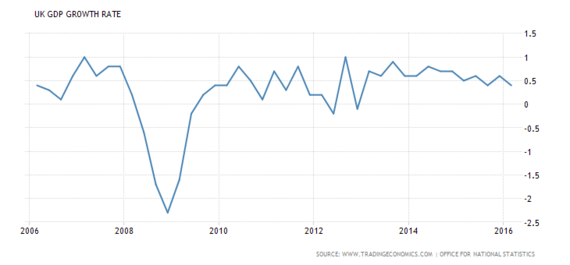The shortest answer is the Great Recession and austerity policies of EU policymakers. What austerity policies? In the UK's case, it was raising taxes in 2010 while cutting government spending in an attempt to pay down debt incurred during and by the Great Recession of 2008-09. But in doing so it has kept the UK close to recession level growth ever since 2008.
Nobelist Paul Krugman has been one of austerity's most vocal critics.
"By late 2008 it was already clear in every major economy that conventional monetary policy, which involves pushing down the interest rate on short-term government debt, was going to be insufficient to fight the financial downdraft. Now what? The textbook answer was and is fiscal expansion: increase government spending both to create jobs directly and to put money in consumers' pockets; cut taxes to put more money in those pockets."
But Brit politicos did just the opposite, with predictable results--near zero GDP growth since 2008.
"I don't know how many Britons realise the extent to which their economic debate has diverged from the rest of the western world - the extent to which the UK seems stuck on obsessions that have been mainly laughed out of the discourse elsewhere," said Krugman. "George Osborne and David Cameron boast that their policies saved Britain from a Greek-style crisis of soaring interest rates, apparently oblivious to the fact that interest rates are at historic lows all across the western world."
This led to the scapegoating by demagogues quick to take advantage of diminishing economic prospects of working class whites in (maybe formerly) Great Britain, and that Donald Trump is taking advantage of in the U.S. Hence the Brits vote for Brexit, and withdrawal from the EU.
The scapegoating that says immigrants take away jobs is really the only way demagogues know how to scare people who don't have another way to understand their predicament, when boosting government spending and benefits would help those most in need of work. The EUs overall predicament has been the same--which is a poor growth record due to the austerity policies of political elites--both in Europe and unfortunately, the U.S. as well, where the Obama administration allowed taxes to rise and government spending cut after the government shutdown in 2011 and consequent spending sequester that downgraded the U.S. sovereign debt rating.
Such policies have prevented the massive spending and investment programs that occurred during President Roosevelt's New Deal, a New Deal that employed those many who could not otherwise have had the dignity of work during the Great Depression.
"But won't this lead to budget deficits? Yes, and that's actually a good thing," continues Krugman. "An economy that is depressed even with zero interest rates is, in effect, an economy in which the public is trying to save more than businesses are willing to invest. In such an economy the government does everyone a service by running deficits and giving frustrated savers a chance to put their money to work. Nor does this borrowing compete with private investment. An economy where interest rates cannot go any lower is an economy awash in desired saving with no place to go, and deficit spending that expands the economy is, if anything, likely to lead to higher private investment than would otherwise materialise."
Unfortunately, it is a lesson lost to Europeans, and American politicos, it seems, so history is once again repeating itself.
Harlan Green © 2016
Follow Harlan Green on Twitter: https://twitter.com/HarlanGreen

